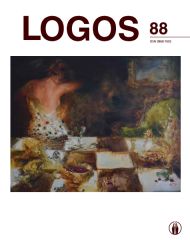Hėrakleitas Ir Parmenidas: Būties Problemos Užkulisiai
Heraclitus and Parmenides: Backstage of the Problem of Being
Author(s): Skirmantas JankauskasSubject(s): Metaphysics, Epistemology, Ancient Philosphy, Existentialism
Published by: Visuomeninė organizacija »LOGOS«
Keywords: concept of reality; theoretical thinking; the same; existence; logos; being;
Summary/Abstract: Traditionally, Parmenides is opposed to Heraclitus. The former introduced the concept of being that was unchangeable in all aspects, while the latter in many of his sophisticated aphorisms advocated the changefulness of Greek reality, i.e. cosmos. The article attempts not only to debate with these approaches, but also to demonstrate that the considerations of the two philosophers are closely related. It is assumed that the starting assumptions of both thinkers should be the same, and that as philosophers they should aim towards the same goals. Therefore, first the article discusses the pre philosophical Greek conception of reality. Philosophizing is seen as an effort of theoretical thinking to articulate the concept of reality according the measure of the same. It is affirmed that Heraclitus in his aphorisms applies the measure of the same to the Greek concept of reality. It is allocated to the relatively autonomous areas of dreaming, everyday thinking and eternal logos. Therefore, his aphorisms about the changefulness of reality are interpreted as a way to query the first two areas and refocus existentially sleepy person to the third factor of reality. The Parmenidean reasoning, on its turn, is seen as an effort to provide a solution to the existential problem posed by Heraclitus. It is shown that the Eleatic philosopher possibly (re)constructs the being by annihilating two constituents of reality and focusing on the constituent that fulfills the requirements of the same measure. The article closes with conclusions about the existential nature of Heraclitus thinking and its echoes in subsequent philosophy.
Journal: LOGOS - A Journal of Religion, Philosophy, Comparative Cultural Studies and Art
- Issue Year: 2016
- Issue No: 88
- Page Range: 6-17
- Page Count: 12
- Language: Lithuanian

